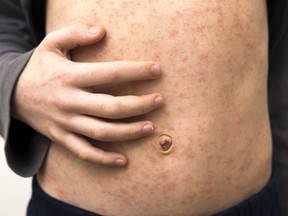Health officials prepare for what some predict could be an explosion of new cases after March break and winter travel.

Article content
As measles cases increase in Ontario and Quebec, some Ottawa doctors say they are fielding a large number of calls from residents who have questions and concerns about measles and measles vaccines.
Some adults are unclear about whether they should be vaccinated, while parents are asking whether they can get a second measles vaccine for their child before they turn four years old, the usual age when children can receive a second dose, according to Ottawa family physician Dr. Britt Harrison.
Advertisement 2
Article content
Article content
“There has been a very large increase in calls around measles,” she said.
Those questions are likely to keep coming as public health officials prepare for what some predict could be an explosion of new cases after March break and winter travel.
As of March 13, eight cases of measles had been confirmed in Ontario this year. That is more than all of last year when there were seven confirmed cases in the province.
Six of this year’s cases were acquired outside Canada during travel. But two were in individuals with no known exposure, such as travel or a link to a confirmed case, said Public Health Ontario in a statement. That is a sign that community spread is already happening.
In Quebec, meanwhile, which had its school March break a week earlier than in Ontario, there were 19 confirmed cases as of March 13, with 14 of them in Montreal.
Public Health Ontario says it is monitoring measles cases in Ontario as well as outbreaks elsewhere.
The highly contagious nature of measles combined with increased global travel and a decrease in childhood vaccination rates has increased the risk of outbreaks of the disease that was eliminated in Canada decades ago.
Advertisement 3
Article content
About 95 per cent of people should be vaccinated to prevent community spread of measles. Those who are unvaccinated, or under-vaccinated, are highly vulnerable as cases spread, particularly during travel, because there are outbreaks around the world.
A spokesperson for the Ontario Minister of Health, Hannah Jensen, said the province has a “stable” supply of vaccines, despite a recent notice of shortages of some measles, mumps and rubella vaccines.
Who should be vaccinated?
Children:
Children are routinely given two doses of measles vaccine (in combination with mumps and rubella), the first around one year and the second between the ages of four and six. Some jurisdictions give the second vaccine as early as 18 months. In Ontario, families must show proof of vaccination, or an exemption, in order for their children to attend school.
Currently, though, many children have fallen behind on routine vaccines because of the pandemic, the shortage of primary caregivers, and increased vaccine hesitancy. In Ottawa, it is estimated that about 62 per cent of children born in 2016 are compliant with school immunization rules, meaning they either are not fully vaccinated or have not reported their vaccination to public health officials.
Advertisement 4
Article content
Babies under 12 months old can be given a dose of MMR vaccine as early as six months old to protect them if they are travelling.
Ottawa physician Harrison said it is reasonable for parents to also ask for a second dose for their children before they turn four given that children in Quebec receive a second dose at 18 months.
Where can you get vaccinated in Ottawa?
Primary caregivers offer vaccinations in their offices as do many walk-in clinics and the Kids Come First health team https://www.kidscomefirst.ca/en/kids-come-first/vaccinate-and-up-to-date.aspx. Ottawa Public Health is also holding special catch-up vaccination clinics. For more information: ottawapublichealth.ca
Adults:
Most adults born before 1970 are considered to have been exposed to measles and are therefore immune, according to Public Health Ontario.
For those born before 1970 and unsure of their vaccination status, Public Health Ontario (PHO), recommends getting vaccinated instead of being given a blood test to see if they have protection. “There is no harm in giving measles-containing vaccine to an individual who is already immune,” PHO said in a statement. It recommends two doses.
Advertisement 5
Article content
Anyone travelling is advised to see their health care provider to get vaccinated before they travel if they are unsure of their status.
A first dose is publicly funded in Ontario for anyone not vaccinated or unsure of their vaccine history. Second doses are only publicly funded for certain groups over the age of 18, said Jensen, a spokesperson for Health Minister Sylvia Jones. That includes health-care workers, post-secondary students, those planning to travel or those whose immunization is recommended by their health-care provider.
What if you or your children are exposed to measles?
If you are unsure of your vaccination history or risk factor, contact Ottawa Public Health, your health provider (or phone 811 to speak with a registered nurse), who may advise you to stay home, get tested, get treatment or to get vaccinated.
What are the symptoms of measles?
The symptoms can develop seven to 21 days after exposure and include:
Rash (3-5 days after symptoms begin). It starts on the face and spreads to the body.
High fever
Runny nose
Cough
Red, watery eyes
People with symptoms should isolate immediately, according to Ottawa Public Health, call before visiting a clinic or hospital and wear a mask.
Recommended from Editorial
Article content





